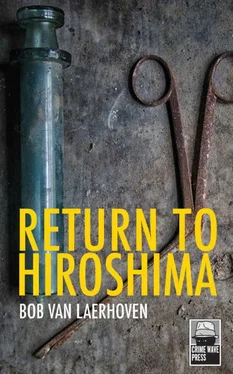Death played a leading role in the girl’s life.
She had a friend, a bald and portly man, the father of a babysitter, who lost his head.
There was a boy fleeing love so hard he thought he was a crow.
(What else should I write? Why does there never seem to be a way out for me? Here, in this cellar, I’m forced to conclude that I’ve always felt the same: no way out. A rumble in the distance just then means a train is on its way, advancing at speed through the tunnel. Why can’t I be sitting in a carriage, watching a nice landscape slip by, far from here? When I was a teenager the world drew me like a magnet. I wanted to go to a place where people would ask without embarrassment why I was so tall and so clumsy. That would be less painful, I told myself, than the furtive glances I had to put up with my father’s minions when they visited the island.
Would Reizo come back? What’s he planning to do? Will I ever see the sun again? On Hashima I used to peer at the rising sun between the charred and half-ruined apartment buildings, on my guard, as if I was afraid its rays would pulverize me if they touched me.)
I can’t remember what age I was when I became obsessed with stories about children who grew up in strange places. How many times did I read Jungle Book ? I pretended I was Mowgli and transformed Hashima’s miserable ruins into a sultry jungle teeming with life. I had to watch out for Shere Kan, the mighty tiger, lord of the animal kingdom, who was coming to get me. When I heard him roar I would tremble. My Shere Kan was more powerful than in the book: at regular intervals he turned into a human being, a giant of a man, with a long neck and penetrating eyes.
When I was older I grew fascinated by the story of Hiroo Onoda, a Japanese soldier who hid in the Philippine jungle for decades after the capitulation because he didn’t believe the war was over. He surrendered in 1974. I read about him in the magazines my father brought from the mainland after I had complained ad nauseam that I was bored and unhappy. I couldn’t get my obsessions out of my head. My life was lost in its own interiority.
Three years ago we got internet on the island. The world wide web was laborious at first, but I was soon surfing at speed in search of points of contact. Without being aware of it I also searched for people who shared my misfortune. I found the weirdest stories that somehow reconciled me with my fate, if only for a while: children locked up by their parents for years on end in sheds and attics as if they were animals, adults who hid children in musty cellars and treated them like luxuries to be indulged whenever they felt the urge.
I fantasised that I was rich beyond imagination and that I was in a coma in hospital after a car accident and could wake up at any moment, throw back the sheets with shouts of joy, and hop, skip and jump my way outside into the sun. I badgered my father almost every day to take me on a trip to the mainland, to my horizon paradise. I wasn’t as scared of him as before, but when I saw that look of impending doom in his eyes, I knew it was time to stop whining. I started again the next day.
(What sort of nonsense is this? How can I write down the story of my life as a rat in a cage in a metro tunnel? Only a madman would think I could! I can’t breathe… I’m going to die… Reizo’s sure to come back. He’s probably gone for food and something to drink. He’ll want to know if I’ve done what he asked. I need to write. I need to surprise him.)
At a certain moment, it must have been when my sexuality awoke raging and kicking from its slumber, I realised that I had been daydreaming for months that my father was chasing me. He was naked and so was I. I ran through the corridors and saw things that made me want to vomit, but at the same time they thrilled me, leaving me with a feeling of mortification, close to fear only more intense, more exciting. My daydreams slowly evolved: I would hide myself in niches and pose Lolita style as my father passed, expose my buttocks coquettishly before disappearing once again with the speed and elegance of a cat. My father – much bigger in my dreams than he was in reality – turned slowly into a Minotaur. He snorted, belched steam from his nostrils, scraped the ground with his hoofs, roared from the bottom of his lungs. It was fantastic. Then he found me and did what bulls do, savage, brutal, like a raging storm.
Afterwards I felt wretched, hung-over, bored.
(Is that what you want to read? Is that what gets your pathetic little junky dick hard? Do you think you have the same power as my father? We’re all insane, all capable of the most miserable things, but some of us do things in our dreams while others dream as they do what their warped minds dictate.)
(Come back and let me go this minute! You can’t imagine what my father will do to you when he hears about this.)
(My life? You want to drink my life? You want to have me? What is there to remember of my broken life? It’s spread out behind me like a swamp inhabited by pale formless figures, and who I am is only a shadow of the person I should have been.)
(What have I done… what have I done? Am I being punished for what I did? Oh, my baby, my baby….)
Hiroshima – Saijo – Takeda, Nagai Shiga and his wife – evening, March 14 th1995
Takeda climbs the stairs to the Shiga residence. He straightens his crumpled suit for the last time, rings the bell and puts on his official face. There’s light inside the house. The woman who opens the door is small and broad-featured.
“Police, ma’am,” says Takeda. “Sorry to bother you at this late hour, but it’s urgent. We’re looking for Reizo Shiga. He’s wanted for question… attempted murder on a foreigner.”
The woman’s broad features seem to collapse. She turns without responding and shouts: “Nagai.” A cry from the heart, a release of pent-up anxiety and pain. She disappears down the corridor without inviting the inspector in. The same stark cry: “Nagai!”
Takeda takes the opportunity to push open the door, take off his shoes and wait in the corridor. The house is tastefully furnished: wood, sharp lines, pale blue tategu doors, elegant sliding panels. A mixture of classical Japanese and western interior design. A tall thin man with grey crew-cut hair and dark sunken eyes appears at one of the sliding doors. Takeda recognises him from newspaper photos: Nagai Shiga is an economist, and with Japan’s economic recession he’s featured in the media a great deal of late.
“My son?” he barks. At the same time he beckons Takeda into the main room of the house, ignoring the usual ceremony. Takeda notices a tokonoma , a traditional alcove filled with delicate flower arrangements, tiny fragile bonsai trees and other family bits and pieces. They sit on tatami mats at a low circular table. Subtle shades of colour, simple, carefully selected furniture, and the interplay of light and shade create a sense of serenity. But Takeda also senses suppressed tension in the room. The economist looks him in the eye: “I knew something like this would happen one day. You might be surprised to hear this from a man of science, inspector, but over the years I’ve come to believe my wife’s conviction that our son has been possessed from birth by a yokai. We’ve seen one psychiatrist after the other with our son, but none of the diagnoses they produced has ever been able to change my wife’s conviction.”
There are many different yokai, Takeda remembers. One is a demon that enjoys preserving a baby’s innocent exterior while transforming its inside into a monster unable to resist its bizarre needs.
Читать дальше












